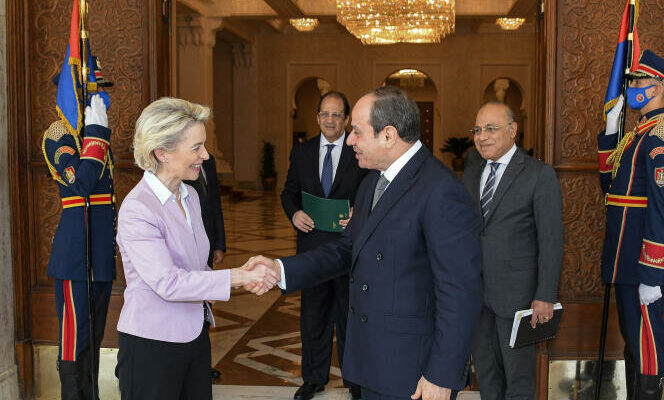After Tunisia, Egypt. Three European prime ministers – Giorgia Meloni, the president of the Italian council, Alexander De Croo and Kyriakos Mitsotakis, the Belgian and Greek prime ministers – and Ursula von der Leyen, the president of the European Commission, are expected on Sunday March 17 in Cairo. They must initial a “joint declaration” with Abdel Fattah Al-Sissi, the Egyptian president, for the establishment of a global partnership with the European Union (EU).
The key for Egypt is a check for 7.4 billion euros, as revealed by Financial Times on March 13. This agreement comes after the announcement, at the beginning of March, of a loan of 8 billion dollars (more than 7.3 billion euros) from the International Monetary Fund to Egypt and, above all, in mid-February of a vast UAE’s $35 billion investment plan. By this measure, European aid seems rather meager.
For Brussels, the urgency is to avoid a collapse of the Egyptian economy, which is very dependent on the outside world. Since Covid-19 and the war in Ukraine, it has been plunged into stagnation and budget deficits keep coming. In addition, the country must face the consequences of the war in Gaza and, in particular, the Houthi attacks in the Red Sea, which led to a reduction in the number of cargo ships in the Suez Canal and caused the country’s revenues to fall. Finally, tourism, which reached records in 2023 with more than 15 million visitors, could suffer from the war at the country’s gates.
Fear of a massive arrival of Palestinians
In detail, the Commission should provide 5 billion euros of budgetary support to Egypt, including 1 billion euros disbursed by June, according to an emergency procedure. The other 4 billion will follow in the longer term. The Egyptian Minister of Finance, Mohamed Maait, confirmed this sum, citing aid of “5 to 6 billion dollars” (4.5 to 5.5 billion euros).
The additional 2.4 billion is made up of a certain number of projects, often already announced, in renewable energies, as well as a significant migration component. The EU must in particular finance coastal surveillance boats, which France has committed to delivering, “even if departures from the Egyptian coast are extremely rare”recalls Sara Prestianni, of the NGO Euromed Rights.
Means will be proposed to secure the borders, both between Egypt and Sudan, to the south, and with Libya, to the east. For several years, the European agency Frontex has noted an increase in irregular entries by Egyptians, with more than 25,000 attempts in 2022, via Libya or Tunisia. In addition, the country hosts nearly 500,000 Sudanese refugees on its soil, according to United Nations data, and some seek to reach Europe by the same route. Added to this is the fear that Palestinians could enter the country en masse. For the moment, Egypt has excluded him.
You have 43.37% of this article left to read. The rest is reserved for subscribers.
